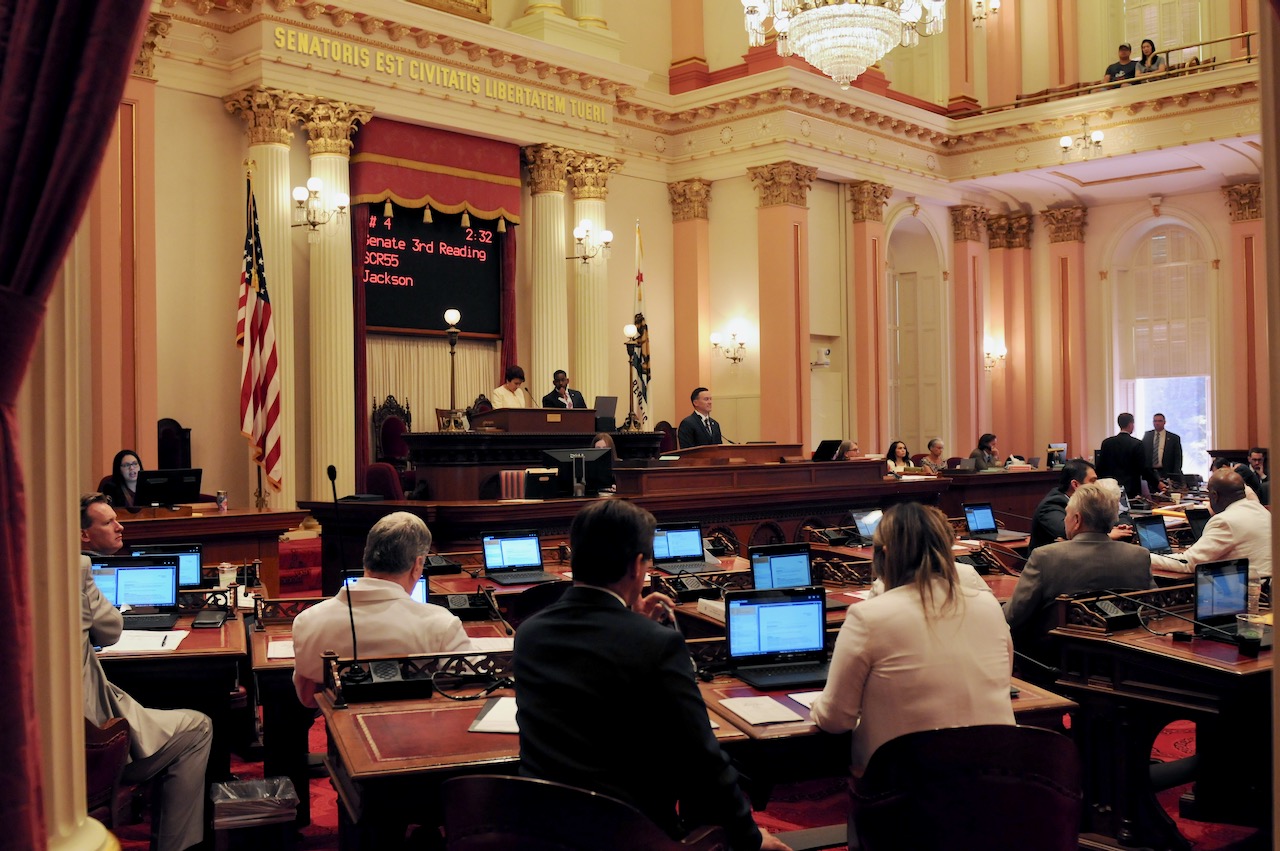
California State Capitol. (Photo: Kevin Sanders for California Globe)
The Role of California’s Division of Labor Standards Enforcement and Labor Commissioner
The DLSE is authorized to expend the money in any appropriation or in any special fund in the State Treasury made available by law
By Chris Micheli, May 13, 2023 2:30 am
California’s Labor Code, in Division 1, Chapter 4, provides for the Division of Labor Standards Enforcement (DLSE) and the Labor Commissioner (LC). Labor Code Section 79 established the DLSE within the Department of Industrial Relations (DIR). The DLSE is under an executive officer who is the Chief of the DLSE, appointed by the Governor and confirmed by the Senate.
The DLSE’s headquarters is located in San Francisco. The DLSE’s employees are required to devote their full time to the work of the DLSE and receive their actual, necessary traveling expenses. The DLSE is also required to maintain offices in San Francisco, Los Angeles, Sacramento, San Diego, Oakland, Fresno, San Jose, and in other places as the Labor Commissioner may deem necessary.
Section 82 provides the DLSE succeeds to, and is vested with, all of the powers, duties, purposes, responsibilities, and jurisdiction of the Division of Labor Law Enforcement, which was abolished. Section 83 provides the DLSE succeeds to, and is vested with, all of the powers, duties, purposes, responsibilities, and jurisdiction of the Division of Industrial Welfare, which was abolished.
Section 89 requires the DLSE to have possession and control of all records, books, papers, offices, equipment, supplies, moneys, funds, appropriations, land, and other property, real or personal, held for the benefit or use of the Division of Labor Law Enforcement and the Division of Industrial Welfare with respect to the functions transferred to the DLSE.
Section 89.5 authorizes the DLSE to expend the money in any appropriation or in any special fund in the State Treasury made available by law for the administration of the statutes the administration of which is committed to it pursuant to this chapter, or for the use, support, or maintenance of any board, bureau, commission, department, office, or officer whose duties, powers, and functions have been transferred to, and conferred upon, the DLSE. The expenditures by the DLSE must be made in accordance with the law in carrying out the purposes for which the appropriations were made or the special funds created.
Section 90 requires the Labor Commissioner, deputies and agents, to have free access to all places of labor. Any person, or agent or officer thereof, who refuses admission to the Labor Commissioner or a deputy or agent or who, upon request, willfully neglects or refuses to furnish them any statistics or information, pertaining to their lawful duties, which are in possession or under control, is guilty of a misdemeanor, punishable by a fine of not more than $1,000.
Section 90.2 requires an employer to provide a notice to each current employee, by posting in the language the employer normally uses to communicate employment-related information to the employee, of any inspections of I-9 Employment Eligibility Verification forms or other employment records conducted by an immigration agency within 72 hours of receiving notice of the inspection. Written notice is required to be given within 72 hours to the employee’s authorized representative and the posted notice must contain specified information.
Section 90.3 provides that it is the policy of this state to vigorously enforce the laws requiring employers to secure the payment of compensation and to protect employers who comply with the law from those who attempt to gain a competitive advantage at the expense of their workers by failing to secure the payment of compensation.
Section 90.5 provides that it is the policy of this state to vigorously enforce minimum labor standards in order to ensure employees are not required or permitted to work under substandard unlawful conditions or for employers that have not secured the payment of compensation, and to protect employers who comply with the law from those who attempt to gain a competitive advantage at the expense of their workers by failing to comply with minimum labor standards.
Section 90.6 provides that, in the case of an investigation by the field enforcement unit, the date of a written notice by the Labor Commissioner to an employer, or other person or entity that may be liable under a provision of the Labor Code, that an investigation has commenced must be deemed the date an action has commenced for purposes of any statute of limitations applicable to determining the period of time for which wages, penalties, damages, or other amounts may be assessed by the Labor Commissioner. These are tolled for a period of 12 months. After expiration of the 12-month period, the time under the applicable statute of limitations will resume running.
Section 90.7 provides that, when the DLSE determines that an employer has specific Labor Code statutes, or otherwise determines that an employer may have failed to report all the payroll of the employer’s employees as required by law, the DLSE must advise the Insurance Commissioner and request that an audit be ordered.
Section 90.8 authorizes the Labor Commissioner to create a lien on real property to secure the amount due to the Labor Commissioner under any citation, findings, or decision that has become final and may be entered as a judgment. The lien on real property may be created by the Labor Commissioner recording a certificate of lien.
Section 91 provides that any person who willfully impedes or prevents the Labor Commissioner or deputies or agents in the performance of duty, is guilty of a misdemeanor, punishable by a fine of not less than $100 nor more than $1,000, or imprisonment for not less than seven nor more than 30 days in the county jail, or both.
Section 92 allows the Labor Commissioner, deputies and agents, may issue subpoenas to compel the attendance of witnesses and parties and the production of books, papers and records; administer oaths; examine witnesses under oath; take the verification, acknowledgment, or proof of written instruments; and take depositions and affidavits for the purpose of carrying out the provisions of the Labor Code and all laws which the DLSE is to enforce.
Section 93 provides that subpoenas issued by the Labor Commissioner, or deputies or agents must be enforced by the courts. It is a misdemeanor to ignore willfully a subpoena if it calls for an appearance at a distance from the place of service of 100 miles, or less.
Section 94 requires the DLSE to be open for business from 9 o’clock a.m. until 5 o’clock p.m. every day except nonjudicial days, and the officers must give to all persons requesting it all needed information which they may possess.
Section 95 authorizes the DLSE to enforce the provisions of the Labor Code and all labor laws of the state. Section 96 requires the Labor Commissioner and his or her deputies and representatives authorized by him or her in writing must take assignments of 12 specified claims.
Section 96.1 requires an annual report by the DLSE of a report to the Department of Finance and the budget committees and relevant policy committees of the Legislature that includes specified information pertaining to the prior calendar year:
Section 96.3 provides that, in cases where employees are covered by a collective bargaining agreement, the collective bargaining representative by virtue of any agreement may be the assignee of all covered employees for purposes of filing claims for wages with the Labor Commissioner.
Section 96.5 requires the Labor Commissioner to conduct hearings as may be necessary. In any action to recover a cash deposit after a determination, the Labor Commissioner must certify in writing to the appropriate court that he or she has heard and determined the validity of claims and demands and that the sum specified is the amount found due and payable. The certificate of the commissioner must be considered by the court.
Section 96.6 created the Industrial Relations Unpaid Wage Fund as a special fund in the State Treasury, which is continuously appropriated. Section 96.7 authorizes the Labor Commissioner, after investigation and upon determination that wages or monetary benefits are due and unpaid to any worker in the State of California, may collect the wages or benefits on behalf of the worker without assignment of the wages or benefits to the commissioner.
Section 96.8 provides that, beginning 20 days after a judgment is entered by a court of competent jurisdiction in favor of the Labor Commissioner, or in favor of any employee, the Labor Commissioner may, with the consent of any employee in whose favor the judgment is entered, collect any outstanding amount of the judgment by mailing a notice of levy upon all persons having in their possession, or who will have in their possession or under their control, any credits, money, or property belonging to the judgment debtor, or who owe any debt to the judgment debtor at the time they receive the notice of levy.
Section 97 prohibits the Labor Commissioner, deputies and representatives from being bound by any rule requiring the consent of the spouse of a married claimant, the filing of a lien for record before it is assigned, or prohibiting the assignment of a claim for penalty before the claim has been incurred or any other technical rule with reference to the validity of assignments.
Section 98 authorizes the Labor Commissioner to investigate employee complaints. The Labor Commissioner may provide for a hearing in any action to recover wages, penalties, and other demands for compensation, including liquidated damages if the complaint alleges payment of a wage less than the minimum wage fixed by an order of the Industrial Welfare Commission or by statute, properly before the DIR or the Labor Commissioner. The Labor Commissioner may also provide for a hearing to recover civil penalties due against any employer or other person.
Section 98.1 requires the Labor Commissioner, within 15 days after the hearing is concluded, to file in the DIR a copy of the order, decision, or award. The order, decision, or award must include a summary of the hearing and the reasons for the decision. Upon filing of the order, decision, or award, the Labor Commissioner is required to serve a copy of the decision on the parties.
Section 98.2 allows, within 10 days after service of notice of an order, decision, or award the parties may seek review by filing an appeal to the superior court, where the appeal is to be heard de novo.
Section 98.3 authorizes the Labor Commissioner to prosecute all actions for the collection of wages, penalties, and demands of persons who in the judgment of the Labor Commissioner are financially unable to employ counsel and the Labor Commissioner believes have claims which are valid and enforceable. Section 98.4 authorizes the Labor Commissioner to, upon the request of a claimant financially unable to afford counsel, represent that claimant in the de novo proceedings.
Section 98.5 requires the Labor Commissioner to have the right to intervene in any court proceedings where questions of the interpretation of statutes or administrative regulations are present. Section 98.6 prohibits a person from discharging an employee or in any manner discriminate, retaliate, or take any adverse action against any employee or applicant for employment because the employee or applicant engaged in any conduct delineated in this chapter.
Section 98.7 provides that any person who believes that they have been discharged or otherwise discriminated against in violation of any law under the jurisdiction of the Labor Commissioner may file a complaint with the DIR within one year after the occurrence of the violation. The one-year period may be extended for good cause. The complaint must be investigated by a discrimination complaint investigator in accordance with this section.
Section 98.74 provides that, if the Labor Commissioner determines, after an investigation of a retaliation or discrimination complaint that a violation has occurred and the Labor Commissioner proceeds with a citation, the Labor Commissioner is required to issue, with reasonable promptness, a citation to the person who has been determined to be responsible for the violation. The citation must be in writing, describe the nature of the violation and the amount of wages and penalties due, and include specified information.
Section 98.75 requires the Labor Commissioner to annually submit a report to the Legislature by February 15 providing specified information with respect to discrimination complaints for the previous calendar year. Section 98.8 requires the Labor Commissioner to adopt all regulations and rules of practice and procedure necessary to carry out the provisions of this chapter.
Section 98.9 provides that, upon a finding by the Labor Commissioner that a willful or deliberate violation of any of the provisions of the Labor Code, within the jurisdiction of the Labor Commissioner, has been committed by a person licensed as a contractor in the course of such licensed activity, the Labor Commissioner must immediately deliver a certified copy of the finding of the violation to the registrar of the Contractors’ State License Board.
Section 98.10 required the Labor Commissioner to develop a model notice pertaining to workplace rights and wage and hour laws for employees of establishments licensed. The model posting notice must be developed using plain language, and in specified languages, and be accessible on the Labor Commissioner’s Internet Web site so that it is reasonably accessible to an establishment that must comply provisions of the Business and Professions Code.
Section 99 authorizes the DLSE to file preferred claims, mechanics’ liens, and other liens of employees in the name of the Labor Commissioner, deputy or representative or in the names of the employees, whenever the facts have been investigated and found to support the claims. A statement that these facts have been found must be alleged in the preferred claim or lien if it is filed in the name of the Labor Commissioner, deputy or representative.
Section 100 allows the DLSE to join various claimants in one preferred claim or lien as well as list them with the data regarding their claims in an exhibit and join them, in case of suit, in one cause of action in cases where no valid reason exists for making separate causes of action for each individual employee.
Section 101 probits any court costs from being payable by the DLSE in any civil action to which the DLSE is a party. Any sheriff or marshal requested by the Labor Commissioner or a deputy or representative of the Labor Commissioner is required to serve the summons in the action upon any person within the jurisdiction of the sheriff or marshal or levy under a writ of attachment or execution in the action upon the property of any defendant without cost to the DLSE, except for keeper’s fees, service fees, and storage charges.
Section 101.5 prohibits any fees from being payable for the filing or recording of any document or paper in the performance of any official service by the Labor Commissioner. The amount ordinarily charged for filing or recording is to be made a part of any judgment recovered by the Labor Commissioner and must be paid by the Labor Commissioner if sufficient money is collected over and above the wages, penalties, or demands actually due the claimants.
Section 102 requires the sheriff or marshal to specify when the summons or process is returned, what costs he or she would ordinarily have been entitled to for this service, and those costs and the other regular court costs that would have accrued if the action was not by the Labor Commissioner are to be made a part of any judgment recovered by the Labor Commissioner and must be paid by the Labor Commissioner if sufficient money is collected over and above the wages, penalties, or demands actually due the claimants.
Section 103 requires the Labor Commissioner, to the extent provided for by any reciprocal agreement entered into, or by the laws of any other state, maintain actions in the courts of the other state for the collection of the claims for wages, judgments, and other demands and may assign the claims, judgments, and demands to the labor department or agency of the other state for collection to the extent that they may be permitted or provided for by the laws of that state or by reciprocal agreement.
Section 104 requires the Labor Commissioner, upon the written request of the labor department or other corresponding agency of any other state or of any person, board, officer or commission of such state authorized to act for and on behalf of the labor department or corresponding agency, maintain actions in the courts of this state upon assigned claims for wages, judgments and demands arising in such other state in the same manner and to the same extent that such actions by the Labor Commissioner are authorized when arising in this state.
Section 105 requires the Labor Commissioner to provide qualified bilingual persons in public contact positions or as interpreters to assist those in these positions to provide information and services in the language of a limited- or non-English-speaking person.
Section 106 authorizes the Labor Commissioner to authorize an employee of any of the agencies that participate in the Joint Enforcement Strike Force on the Underground Economy to issue citations and issue and serve a penalty assessment order.
- Conservation Banks - February 22, 2026
- Mergers of Unincorporated Associations - February 21, 2026
- A Historic Look at Bill Introductions in the California Legislature - February 21, 2026





One thought on “The Role of California’s Division of Labor Standards Enforcement and Labor Commissioner”